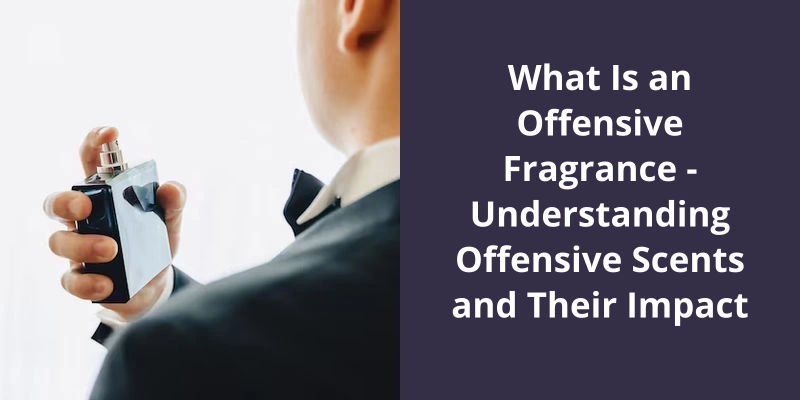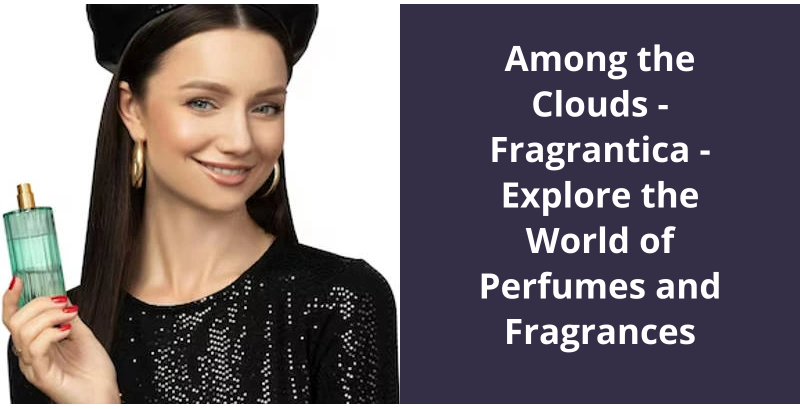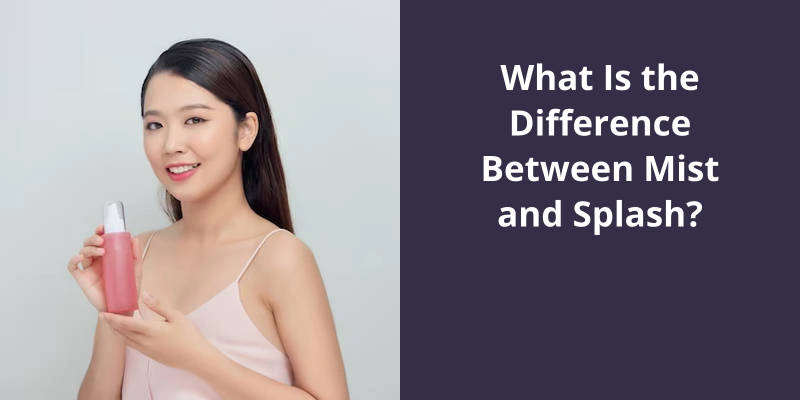An offensive fragrance is a type of scent that is usually unpleasant or bothersome to people. It’s subjective and can depend on individual preferences, cultural norms, and specific sensitivities or allergies. At times, a fragrance considered appealing by some might be perceived as offensive by others due to its intensity or particular notes. Personal hygiene products, perfumes, or environmental scents can all potentially be sources of offensive odors. Despite a scent being generally pleasurable, its overuse can be overpowering, leading to discomfort, headaches, or even allergic reactions, thereby rendering it offensive. In understanding offensive fragrances, it’s important to note that it’s not merely about the nature of the scent, but also about the context, concentration, and personal perceptions associated with it.

How Can Perfume Be Offensive?
When perfumes and colognes are synthesized, artificial chemicals are used to create the desired scent. These chemicals can have a complex mixture of odorous volatile compounds that, when combined, can be overwhelming to some individuals. The chemical compounds can also react with body chemistry, causing an unpleasant smell. This reaction creates a sour or musty odor, which can be incredibly offensive. Perfumes can also consist of animal-based ingredients like musk and civet, which are known for their intense and pungent smells. These ingredients can trigger allergic reactions in some people, creating an unpleasant experience overall.
Additionally, the use of perfumes and colognes in a social setting can be frowned upon, especially in professional settings. In business meetings or other formal gatherings, wearing a strong perfume or cologne can make others uncomfortable. Strong fragrances can distract and overpower other people, making it challenging to stay focused on the task at hand. It can also create an environment that’s unprofessional and create a perception of poor decorum. The use of perfumes can be seen as an invasion of personal space, as the strong smells are difficult to ignore and can affect those in close proximity to the wearer.
There’s also a cultural aspect to the use of perfumes and colognes. In some Asian countries, traditional fragrances are earthy and spicy, while Western perfumes are floral or sweet, which can be perceived as too strong and unpleasant. The use of perfumes can also be a generational divide, as older individuals may prefer traditional scents, while younger generations prefer fresh and clean fragrances.
Finally, the use of perfumes and colognes can be offensive to animals, primarily dogs. Dogs rely heavily on their sense of smell, and strong fragrances can disrupt their ability to sense their natural environment. Wearing perfumes can also make it difficult for dogs to identify human scents, which can negatively impact their behavior. Many perfumes contain harmful chemicals that can cause pollution and damage delicate ecosystems.
There are natural alternatives to perfumes and colognes, such as essential oils, that can provide a pleasant fragrance without the negative side effects. Ultimately, it’s up to all of us to be responsible in our use of fragrances and to respect others preferences and health needs.
The Impact of Perfume on Indoor Air Quality and Health: Synthetic Perfumes Can Release Volatile Organic Compounds (VOCs) That Can Cause Respiratory Problems and Worsen Existing Conditions Like Asthma and Allergies.
- Synthetic perfumes can release volatile organic compounds (VOCs).
- VOCs can cause respiratory problems.
- VOCs can worsen existing conditions like asthma and allergies.
- The impact of perfume on indoor air quality and health should be taken into consideration.
Therefore, it’s important to understand the potential health risks associated with fragrance ingredients and to take measures to protect ourselves and our environment from their harmful effects.
Are Fragrance Ingredients Safe?
The question of whether fragrance ingredients are safe is a complex and controversial one. While many people enjoy the scents of perfumes, colognes, and other fragranced products, the chemicals used to create these scents can have serious health implications. Many of these ingredients can cause sensitization and allergies, respiratory diseases such as asthma, and irritation of the skin and eyes.
One major concern with fragrance ingredients is their potential carcinogenicity. Additionally, some of these chemicals have been linked to hormone disruption, which could also contribute to the development of certain types of cancer.
Many fragrance chemicals are persistent and bioaccumulative, meaning they remain in the environment for a long time and can build up in the tissues of animals and humans. Once these chemicals enter the ecosystem, they can cause a range of problems such as disrupting the endocrine system of animals, altering reproductive function, and impairing the development of fetuses and children.
The Effects of Fragrance Ingredients on Indoor Air Quality and the Respiratory Health of People.
This topic explores the impact of fragrance ingredients on the air quality and respiratory health of people indoors.
Fragrance is a complex and nuanced world, and for the true enthusiast, it goes far beyond just picking a nice scent off the shelf. The fragrance snob is concerned with everything from the quality of the ingredients to the history of the brand, and they take their choices seriously. But what makes a fragrance snob, and what drives them to pursue the perfect scent? Let’s take a closer look.
What Is a Fragrance Snob?
A fragrance snob is essentially someone who’s exceptionally picky about the fragrances that they wear or find acceptable. It isn’t necessarily a negative term, but rather a descriptor of a persons particular tendencies and preferences. Typically, fragrance snobs have a discerning nose and can detect even the slightest nuances in a scent. They aren’t easily swayed by marketing tactics or brand names, and instead rely on their own sense of smell to determine the quality and worth of a fragrance.
It requires a certain level of expertise and knowledge, as well as a refined palate. A true fragrance snob can appreciate the complex layers of a scent, and the way in which different notes interact with each other to create a truly unique and memorable experience. They may also be drawn to certain ingredients or styles of perfumery, and have a deep understanding of the history and evolution of fragrance as an art form.
Of course, with this level of expertise comes a certain level of snobbery. This can sometimes come across as pretentious or elitist, and may lead to a certain level of exclusion or snobbery within perfume communities.
Whether you prefer cheap and cheerful scents or rare and luxurious fragrances, embrace your love of fragrance and let your nose lead the way. After all, life is too short to wear a perfume you don’t love.
Source: Are you a fragrance snob? The Fragroom guide reveals all
As humans, we’ve always been fascinated by the power and allure of fragrances. But did you know that fragrance isn’t just a physical sense, but also holds great spiritual significance? In fact, throughout history, fragrance has been considered a sign of God and a representation of spirituality itself. Sufis believe that fragrance is a manifestation of the divine, and that it’s the power to evoke deep spiritual inspiration in us. Let’s explore what fragrance means spiritually and how it can impact our lives.
What Does Fragrance Mean Spiritually?
Scents and fragrances have always been an integral part of spiritual practices and have been used to enhance the connection between the body, mind, and soul.
The use of incense, candles, and essential oils during prayer can create a peaceful and sacred atmosphere that allows for deeper spiritual connection and introspection.
In Hinduism, fragrances are used during rituals and prayers to please the gods and gain their blessings. Similarly, in Buddhism, incense is used to purify the environment and create a sense of calm during meditation practices. In Christianity, fragrances such as frankincense and myrrh are used as symbols of the gifts brought by the wise men to baby Jesus, and are often used in religious ceremonies.
The History and Cultural Significance of Fragrance in Different Spiritual Practices.
This topic discusses the role of fragrances in various spiritual practices throughout history. It delves into the cultural significance of different scents and their use in rituals, ceremonies, and other spiritual activities.
Conclusion
They can cause headaches, nausea, respiratory problems, and allergic reactions. One person's favorite fragrance may not be appreciated by others. Therefore, it’s important to be considerate and respectful of those around us by choosing fragrances that are appropriate for different situations. It’s also important to remember that fragrances are a personal choice, and not everyone will agree on what’s offensive or not. Ultimately, the best approach is to find a balance that works for everyone and to be mindful of how our fragrances affect those around us.





